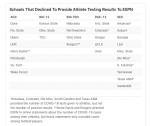WriterGoph
Well-known member
- Joined
- Jan 21, 2009
- Messages
- 6,059
- Reaction score
- 6,469
- Points
- 113
Just out of curiosity how many black individuals are posting on this site and how many of us are white. For those that are white posters I find it fascinating that you know so much one way or another. I especially love the white posters who pretend to be on board with the BLM movement, but really are just keyboard fighters. If any of you are really passionate about social injustice, social equality, or racial issues do something other than post about it and talk about how others on here have no idea. It’s amusing.
and to quote their website “ We disrupt the western prescribed nuclear family structure requirement...” which I’m not sure why it needs to be disrupted for everyone?
I'll think you'll see plenty of people "doing something about it" on November 3. Now THAT will be amusing

